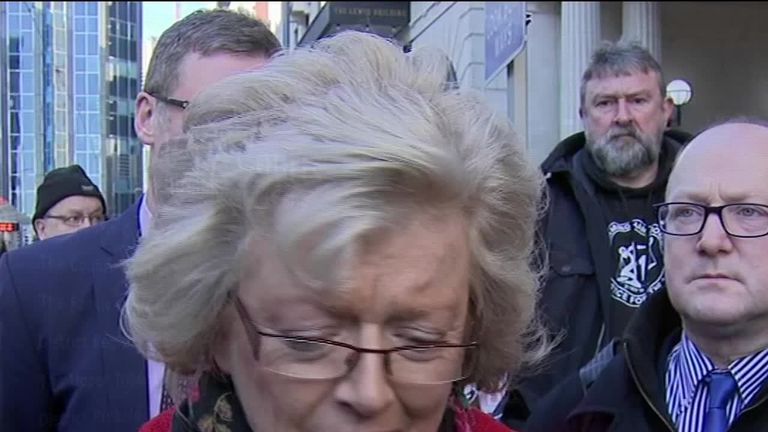'I'm more angry now than ever': Inquests into Birmingham pub bombings open
The jury will hear evidence that British security services may have been warned about the attack weeks before it happened.
Monday 25 February 2019 20:57, UK
The inquests into the deaths of 21 people who died in the Birmingham pub bombings have opened, following a long campaign for justice by families of the victims.
The hearings began with a minute's silence after the names of those killed were read out.
On the evening of 21 November 1974, two bombs exploded in busy pubs in the city centre, leaving 21 dead and more than 200 people injured.
The coroner, Sir Peter Thornton QC, told the jury: "This inquest is about 21 separate people. 21 separate lives lost from two terrible events in Birmingham.
"It is those lives and the circumstances which led to their deaths that these inquests will consider."
The bombings took place at the height of the IRA bombing campaign and the jury was told they will have to decide whether the terror group was responsible for the attack.
They will also have to decide whether the victims were unlawfully killed.
"No one has been successfully convicted for these killings. That is very hard for the families, indeed for the people of Birmingham," the coroner said.
But he ruled that the issue of exactly who carried out the attacks will not be considered as part of these inquests.
"Nobody is on trial here," he said.
"An inquest does not decide matters of criminal or civil liability. There is no question of attributing blame to any individual.
"There is no question of seeking to identify the perpetrator of the bombing. That is a task for criminal investigation by the police and prosecution."
Relatives of the victims fought for the suspected perpetrators to be named during the inquests but lost their legal battle.
The jury were shown images of the aftermath of the explosions.
Julie Hambleton, whose sister Maxine was 18 when she was killed in the attack, broke down in tears as she described how difficult it was to hear the details.
Standing outside the court, she sobbed as she said, "I can't begin to tell you how angry I am.
"I'm more angry now than I ever have been that my sister is not here to be with us, to see this, and to know what we do for the 21."
Jurors were told they will hear evidence that the British security services may have been warned about the attacks including a conversation that was overheard in prison two weeks before the attack.
There will also be evidence that West Midlands Police may have been warned and could have done more to save lives.
The current chief constable of the force was in the coroner's court and afterwards told reporters, "clearly today is a very historic day, for the people of Birmingham and in particular the families.
"West Midlands Police are an interested party in the inquest but our perspective is to assist the coroner and the jury with the process that has to take place here in the city."
Six men were jailed for life for the attacks in 1975. Hugh Callaghan, Paddy Hill, Gerry Hunter, Richard McIlkenny, Billy Power and Johnny Walker became known as the Birmingham Six.
Their convictions were overturned in 1991 and they were released after 17 years in prison for a crime they did not commit.
Since then, no one has faced trial in connection with the attack.
The inquest hearings are due to last six weeks.










